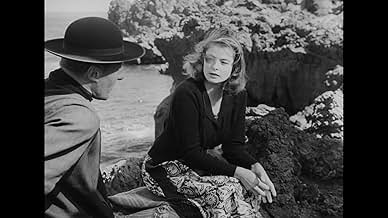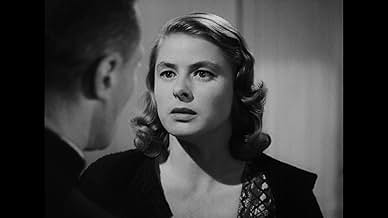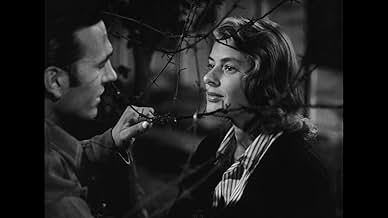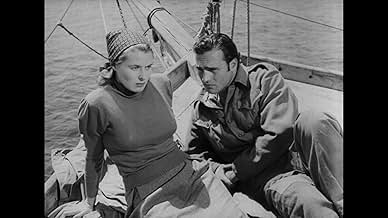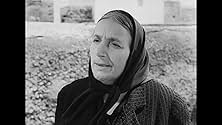IMDb रेटिंग
7.2/10
8.5 हज़ार
आपकी रेटिंग
अपनी भाषा में प्लॉट जोड़ेंKarin, a young woman from the Baltic countries, marries fisherman Antonio to escape from a prison camp. But she cannot get used to the tough life in Antonio's volcano-threatened village, Str... सभी पढ़ेंKarin, a young woman from the Baltic countries, marries fisherman Antonio to escape from a prison camp. But she cannot get used to the tough life in Antonio's volcano-threatened village, Stromboli.Karin, a young woman from the Baltic countries, marries fisherman Antonio to escape from a prison camp. But she cannot get used to the tough life in Antonio's volcano-threatened village, Stromboli.
- पुरस्कार
- 2 जीत और कुल 1 नामांकन
Gaetano Famularo
- Man with Guitar
- (बिना क्रेडिट के)
Angelo Molino
- Child
- (बिना क्रेडिट के)
Roberto Onorati
- Man
- (बिना क्रेडिट के)
फ़ीचर्ड समीक्षाएं
Even in a displaced persons camp, Ingrid Bergman, as Karen, a Lithuanian refugee, manages to dress better and look more beautiful than everyone around her. After her petition for passage to Buenos Aires is denied, she marries a POW from the adjacent camp. A native of the Italian volcanic island Stromboli, Antonio - Mario Vitale - brings her to his home. The village is a harsh place carved from the cinders of the mountainside, and half-deserted. As soon as she sets foot on the island, she can see she's made a mistake, but instead of accepting what she bargained for, she pesters Antonio to make more money so they can leave. He doesn't want to go - this is his home, and he is content even with this fussy wife. The men are fishermen, she constantly hears crying children, and the women dislike her immodesty. She redecorates the house, hiding his shrine and old photographs, putting out vases and flowers, turning her floral dresses into bright curtains. But she disregards the social rules, befriending a seamstress who's a "fallen woman" and playing in the sea with a group of boys. The inevitable clash between the peasant fisherman and the woman with aesthetic aspirations their simple life cannot satisfy, comes to a head with the eruption of the volcano. If I rated only the plot, this movie would earn a 5 - but the cinematography is magnificent. Otello Martelli's use of light and shadow, camera angle, and the restless natural world he filmed, create images that last long after the story has blown away like the fluff it is.
Rossellini's "Stromboli, terra di Dio" is a film on the line between fiction and reality more than usual for the acclaimed director. Most of the central part, where Karin just lives in Stromboli and complains about stuff was not written as in a normal screenplay: Rossellini chose possible elements of the environment or popular habits and filmed them in the movie, putting Karen in it like an extrernal observator. This has a double effect: neorealism comes to some of its highest achievements (like the tuna fishing and the eruption of the volcano) but to the loss of a fantastic actress such as Ingrid Bergman, who always feels out of place. Careful: I didn't say KAREN, I said BERGMAN. Because as a character she should be out of place, and she is even esthetically: she's always combed and white as the moon, while the inhabitants are rusty and dirty. But the actress herself is out of place in this film, and that is not a good thing at all. Her lines are dumb, repetitive, and Bergman actually did a great job managing to not disappear in such irrelevance. She still lives the scene, but her attempt is clearly forced into a new, uncharted territory as was Italian filmmaking for an American diva. We could say then that Ingrid is just as lost as her character.
What I just can't stand in this film is the necessity of squeezing the religious conversion (I'm talking about the Italian version of the film, American and International versions have slightly different endings for that time's commercial policies). It was the result of Rossellini's collaboration with powerful politicians and Church men, to be specific Giulio Andreotti and Felix Morlion, whose intention was to use a critically acclaimed author's cinema for political propaganda. I hate when other interests interfere with artistic purposes, and here the last moments are definitely flawed with an out of the blue realization of the power and existence of God for no good reason.
As I said before, neorealist features are what makes this film enjoyable and a classic. Apart from the brilliant scenes I mentioned above, I really liked the harsh depiction of the patriarchy that unfortunately still exists and thrives especially in the South of Italy. I actually felt bad and angry at Antonio as he jerks his wife with no respect and beats her like an animal, but I know very well that even today that is the norm in so many families and that simply pisses me off. Kudos to Rossellini for depicting that so realistically, but then again he's a great director exactly because of scenes like those.
What I just can't stand in this film is the necessity of squeezing the religious conversion (I'm talking about the Italian version of the film, American and International versions have slightly different endings for that time's commercial policies). It was the result of Rossellini's collaboration with powerful politicians and Church men, to be specific Giulio Andreotti and Felix Morlion, whose intention was to use a critically acclaimed author's cinema for political propaganda. I hate when other interests interfere with artistic purposes, and here the last moments are definitely flawed with an out of the blue realization of the power and existence of God for no good reason.
As I said before, neorealist features are what makes this film enjoyable and a classic. Apart from the brilliant scenes I mentioned above, I really liked the harsh depiction of the patriarchy that unfortunately still exists and thrives especially in the South of Italy. I actually felt bad and angry at Antonio as he jerks his wife with no respect and beats her like an animal, but I know very well that even today that is the norm in so many families and that simply pisses me off. Kudos to Rossellini for depicting that so realistically, but then again he's a great director exactly because of scenes like those.
I wanted to take the time to write of this work by my grandparents Rossellini and Bergman, as it has always been a film of both great emotion and confusion for me personally. If anything, there is much to be said for my grandmother moving from Hollywood to a deserted volcanic island with meager means and low production capacity. This speaks to her love not only of my grandfather's work, but also to her sense of adventure and courage, looking for new ways to express herself as an actress. When it comes to my grandfather, this is his most impulsive directorial work. He was in a both stressful and joyous time in his life and i can only imagine the feelings of both anguish and happiness that he felt. All of these swirls and jests of emotion are apparent, they are as evident as the very powerful setting itself. Though the film is certainly not perfect, and at times even slow and overtly dramatic, it is nonetheless sincere and beautiful. It is a work of love made by two people in love.
7cogs
"Stromboli" is a fascinating examination of suffering, desperation, faith and the desire for redemption. I've never liked Rossellini's films as much as Bresson's but I think the two directors often dealt with the same themes in similar ways, with minor stylistic variations. Where Rossellini used actors and non-actors who gave performances, Bresson used models and types who were instructed to remain impassive. Where Rossellini's films focused on passionate characters and emotional situations, Bresson approached his stories with a scientist's dispassion. I've always found Rossellini's films strange they are often parables that invest heavily in domestic melodrama and the histrionics of their characters. Nevertheless, I think "Stromboli" is one of his most successful films. Karin suffers so much--a war refugee, internment camp resident and then harried wife and social pariah on a desolate island--that it is easy to see how she is blind to faith. Despite her eventual redemption Rossellini doesn't paint Karin as a saint. Her protestations regarding the social politics of the island develop into a crusade to transgress their customs and protocols, often in self-righteous objection to the constraints placed on her. And her willingness to exploit her sexuality further confirms her all too human (and flawed) nature. The scenes where Karin attempts to seduce the priest and later seduces the lighthouse keeper are brimming with carnal sensuality. Bergman, as always, is excellent.
"La terra e dura qui." Ingrid Bergman is a powerhouse in this film (perhaps out of love and devotion to the director), but she still can't match the power of the menacing volcano on this remote island off the coast of Italy. Bergman plays a prisoner of war with a checkered past stuck in a women's camp, who marries a Strombolian in order to provide herself with the security she needs. Trouble awaits her, and the first sign we get of that is when she starts to complain of being cold on the boat that is taking her to her new life. What she finds is not up to her high Continental standards, and her attitudes towards the locals and the place itself diminish her already low stature as an outsider. It is less the people however, than the general character of the place that turns her off. The volcano, unnamed by the villagers, always awaits in the background, and setting itself becomes one of the main characters (thus the importance of the title), a force to be reckoned with, much like her character.
Although this film is not noir in any way, and Rossellini himself would probably turn in his grave for hearing me say this, Bergman's character certainly does not hesitate in using her female "wiles" to get what she wants and needs. She survived a world war on what we take are wits and flexible morals, so she will also make it through this and I love her for it.
She even attempts to seduce the local priest by cooing "I knew you were the only person who could help me." Having that attempt fail, she tries with the village lighthouse keeper seen at right, and I don't even have to explain the power of her touch. As she asks for help to escape from the village, she softly touches his foot with hers, and creates an unbelievably palpable feeling of erotic energy, something unheard of in mainstream movies today. I know, that's such a cliché, but it's true.
Anyway, I won't discuss the ending, which angered me as a modern woman (even Bergman didn't seem to be buying it), but I will say that the film impressed me with its use of setting comprising plot, character, mise-en-scene, and theme. The film IS setting. It's also worth it just to see the non-actors performing a yearly tuna fishing ritual that dates back to the Phoenecians. Rossellini films are never just stories, they are historical documents. And I love him for that.
cococravescinema.blogspot.com
Although this film is not noir in any way, and Rossellini himself would probably turn in his grave for hearing me say this, Bergman's character certainly does not hesitate in using her female "wiles" to get what she wants and needs. She survived a world war on what we take are wits and flexible morals, so she will also make it through this and I love her for it.
She even attempts to seduce the local priest by cooing "I knew you were the only person who could help me." Having that attempt fail, she tries with the village lighthouse keeper seen at right, and I don't even have to explain the power of her touch. As she asks for help to escape from the village, she softly touches his foot with hers, and creates an unbelievably palpable feeling of erotic energy, something unheard of in mainstream movies today. I know, that's such a cliché, but it's true.
Anyway, I won't discuss the ending, which angered me as a modern woman (even Bergman didn't seem to be buying it), but I will say that the film impressed me with its use of setting comprising plot, character, mise-en-scene, and theme. The film IS setting. It's also worth it just to see the non-actors performing a yearly tuna fishing ritual that dates back to the Phoenecians. Rossellini films are never just stories, they are historical documents. And I love him for that.
cococravescinema.blogspot.com
क्या आपको पता है
- ट्रिवियाDuring production of this film, Ingrid Bergman entered into an extra-marital affair with Roberto Rossellini and became pregnant, the two eventually getting married and having three children. The resulting scandal in America effectively blacklisted her from the North American movie market and she was even condemned by politicians and religious figures. She was finally forgiven and welcomed back to America upon the success of Anastasia (1956), but her Hollywood career was temporarily ended by this movie.
- गूफ़Though used by women, pants were not so popular on that time. Is strange that a poor refugee like the character played by Bergman wears pants almost the entire movie.
- क्रेज़ी क्रेडिटOpening credits: "I was found of them that sought me not; I was made manifest unto them that asked not after me." (New Testament, St. Paul's letter to the Romans, Chapter 10, Verse 20)
- इसके अलावा अन्य वर्जनSeveral running times exist. The main difference between the 81 min. US version and the 105 min. Italian version was in the ending, with religious themes cut out.
- कनेक्शनEdited into Histoire(s) du cinéma: Une histoire seule (1989)
टॉप पसंद
रेटिंग देने के लिए साइन-इन करें और वैयक्तिकृत सुझावों के लिए वॉचलिस्ट करें
- How long is Stromboli?Alexa द्वारा संचालित
विवरण
- रिलीज़ की तारीख़
- कंट्री ऑफ़ ओरिजिन
- भाषाएं
- इस रूप में भी जाना जाता है
- Stromboli
- फ़िल्माने की जगहें
- उत्पादन कंपनियां
- IMDbPro पर और कंपनी क्रेडिट देखें
बॉक्स ऑफ़िस
- बजट
- $10,00,000(अनुमानित)
- दुनिया भर में सकल
- $17,532
- चलने की अवधि1 घंटा 47 मिनट
- रंग
- पक्ष अनुपात
- 1.37 : 1
इस पेज में योगदान दें
किसी बदलाव का सुझाव दें या अनुपलब्ध कॉन्टेंट जोड़ें

टॉप गैप
By what name was Stromboli (Terra di Dio) (1950) officially released in India in English?
जवाब

